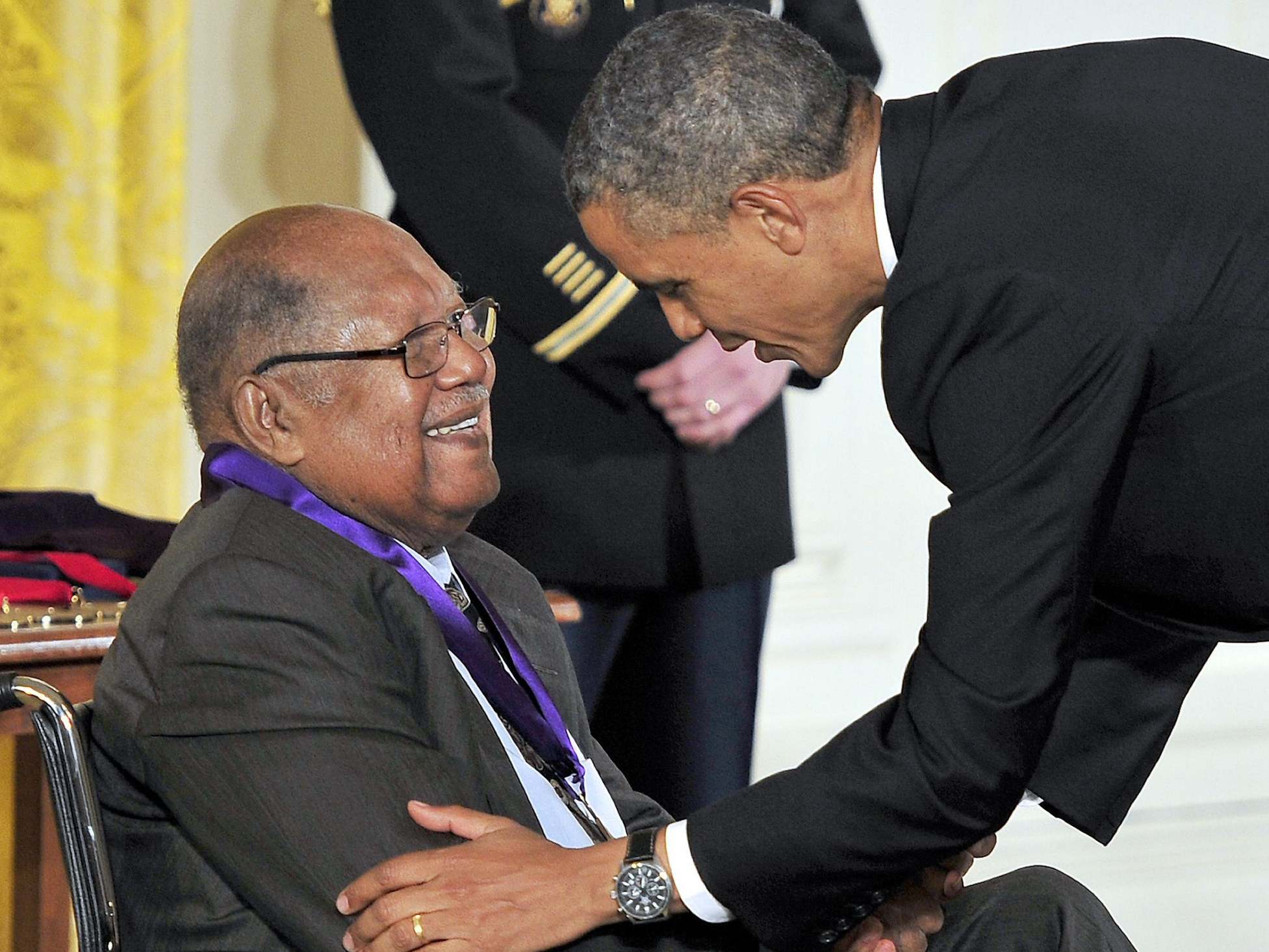Ernest J Gaines: Novelist who tackled racial injustice with skill and grace
In ‘A Lesson Before Dying’ and other acclaimed works, Gaines portrayed the African-American experience under Jim Crow and beyond

The novelist Ernest J Gaines drew acclaim and comparisons to Dickens and Faulkner for his richly textured tales of racial injustice in rural Louisiana, including The Autobiography of Miss Jane Pittman and A Lesson Before Dying.
Gaines, who has died aged 86, spent his first 15 years on a plantation near Baton Rouge, before moving with his family to northern California. But in many ways he never left the landscape, rhythms and painful history of his childhood.
In eight novels and many short stories, Gaines created a fictional world surrounding a town called Bayonne, in St Raphael Parish, not unlike his boyhood home in Pointe Coupee Parish.
“There were places I couldn’t go, things I couldn’t say, questions I couldn’t ask,” he said in 1993. “You had to work for nothing and take what they gave you. Yet at the same time, you had all the fields to run in, the river to fish in, the swamp to hunt in … I was freer than any white kid, and at the same time, not free at all. What a paradox.”
In 1971, he published Miss Jane Pittman, an account of a 110-year-old woman who had been born into slavery. In a New York Times review, Alice Walker pronounced it a “grand, robust, most valuable novel that is impossible to dismiss or to put down”.
Written in the form of an oral history, the novel examines a century of African-American life from the perspective of the title character, who could recall the Civil War and lived long enough to witness the beginning of the civil rights movement. It was adapted in 1974 as a television movie, with Cicely Tyson as the title character, and won nine Emmy Awards.
His other novels included A Gathering of Old Men (1983), in which more than a dozen ageing black men in rural Louisiana recount their struggles and humiliations under segregation; and A Lesson Before Dying (1993), which won the National Book Critics Circle Award for fiction and became a bestseller in 1997 when selected for Oprah Winfrey’s book club. The tale of an uneducated and innocent African-American man accused of killing a white man in Louisiana in 1948, A Lesson Before Dying was adapted for an Emmy-winning HBO production in 1999.
Ernest James Gaines was born in 1933, on River Lake Plantation, in Pointe Coupee Parish, Louisiana. After his parents divorced, his mother remarried, and Gaines became the oldest in a mixed family of 12 children. He began working in the fields when he was eight and attended classes in a church on the plantation.
At 15, he moved to Vallejo, California, where his mother and stepfather were living. It was there that he entered a library for the first time. He was drawn to 19th-century Russian writers such as Ivan Turgenev and Anton Chekhov and to the novels of William Faulkner, John Steinbeck, Willa Cather and Zora Neale Hurston, whom he called “the only black writer who has influenced my work”.
“I knew I wanted to be a writer,” Gaines said in 1993, “and by the age of 20 I knew I wouldn’t let any obstacle get in the way – family, religion, politics, racism or anything else.”
After serving in the army, Gaines graduated in 1957 from San Francisco State University, where he published his first stories. He later studied with novelist Wallace Stegner at Stanford University. To support himself, Gaines held jobs as a postal worker and printer’s assistant. He published his first novel, Catherine Carmier, in 1964, followed three years later by Of Love and Dust.
In a 1969 essay, writer James Baldwin lamented that caricatures of African-American life appeared too often in popular culture “while leaving absolutely unnoticed and untouched such a really fine and truthful study of the black-white madness as, for example, Ernest J Gaines’ Of Love and Dust”.
In 1978 Gaines published In My Father’s House, about the fraught relationship of a civil rights leader and his estranged son. Gaines’ final book, The Tragedy of Brady Sims, appeared in 2017.
After living in San Francisco for many years, Gaines returned to Louisiana in 1984 as a professor and writer-in-residence at the University of Louisiana at Lafayette. He bought a six-acre plot on the plantation where he grew up, built a house and restored the rustic church where he had gone to school as a child.
He received a MacArthur Award, or so-called “genius grant”, in 1993, and in 2013 he was presented a National Medal of Arts by President Barack Obama.
As a child, Gaines recalled that neighbours would often congregate at his aunt’s house, telling stories about their lives and about events reaching deep into the past. Because some of them did not know how to write, Gaines began to compose letters for them.
“They’d want me to fill in both sides of the paper, to use it all up, so I had to start inventing,” he once said. “I’m still trying to write letters – not only for the people I knew, but for the ones who died long before I was born. They didn’t keep diaries, they didn’t keep journals, they couldn’t write letters. So what I’m trying to do is imagine how they must have felt.”
He is survived by his wife, Dianne Saulney Gaines, and four stepchildren.
Ernest J Gaines, novelist, born 15 January 1933, died 5 November 2019
© Washington Post
Join our commenting forum
Join thought-provoking conversations, follow other Independent readers and see their replies
Comments
Bookmark popover
Removed from bookmarks